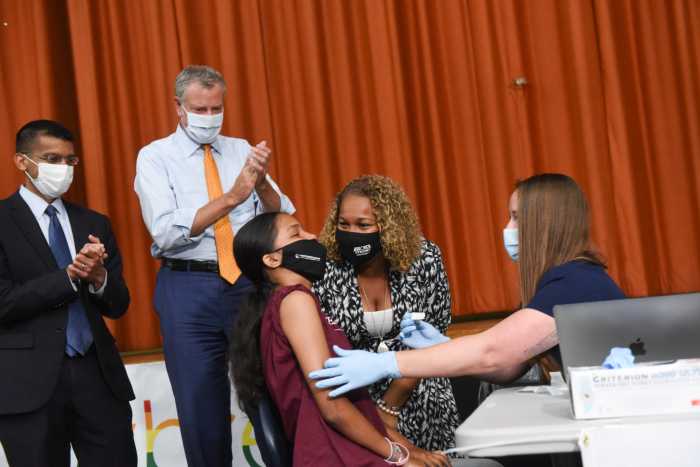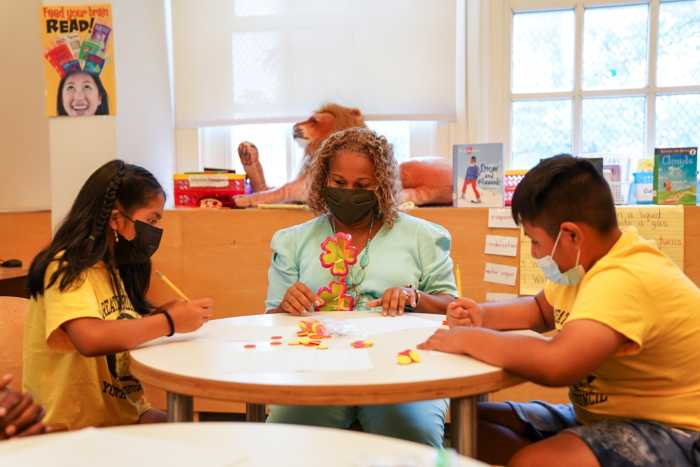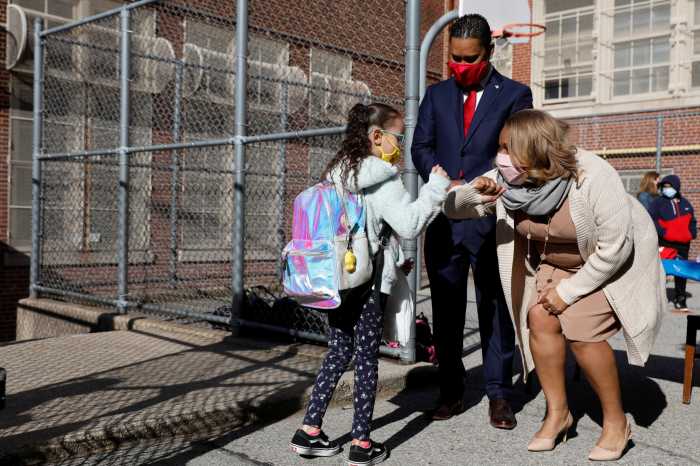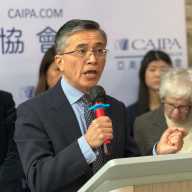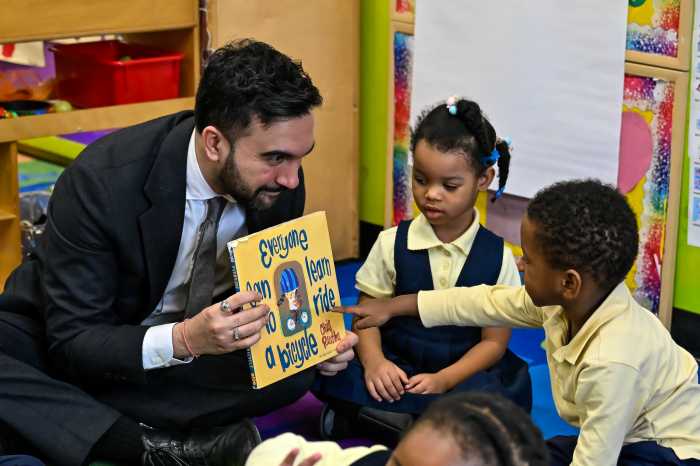Queens lawmakers are speaking out against Mayor Bill de Blasio’s decision to phase out the controversial Gifted and Talented (G&T) Program in New York City’s public schools and instead make it more accessible to all children, including better outreach into all communities.
The mayor, along with Schools Chancellor Meisha Porter, announced the end of the G&T program on “The Brian Lehrer Show” on Friday, Oct. 8, and introduced a new structure for accelerated learning for individual kids beginning in third grade that won’t separate them into special classes.
“I just want to say this is a really exciting day and the chancellor and I are so happy that we’re going to end something that I think was a mistake all along, a single test for 4-year-olds that determined so much of their future,” de Blasio said. “We’re going to reach tens of thousands of more kids with accelerated learning, and so this is a really important day for New York City.”
According to Porter, no single test should determine any child’s future.
“What I know from being a teacher and a leader, is that there are so many more students who are gifted or talented, who are brilliant, who have special gifts, and I think this is a moment about creating opportunities for all students to demonstrate their powerful learning abilities and for teachers to really tap into those gifts,” Porter said.
The city’s plan, Brilliant NYC, will be the blueprint for accelerated learning for all elementary students in NYC. A citywide forum and community meetings will be held to discuss the changes, but dates have not been announced.
According to the mayor, Gifted and Talented students will remain in their programming without disruption to their learning, and Brilliant NYC will be phased in for grades one through three. Starting with kindergarten in September 2022, accelerated learning will be offered to all 65,000 kindergarteners.
“We’re going to have kids learning altogether in one classroom where the kids who have special abilities are given the extra help, the extra attention to go farther ahead in their studies with help from teachers, with team teaching in some cases, with digital education,” de Blasio said.
According to Porter, while many classrooms are operating with kids learning at a variety of paces, they’re adding a component of additional training for teachers to recognize those talents and provide individualized instruction for students.
The elimination of the G&T program addresses racial disparities in public schools that opponents say discriminate against Black and Hispanic children, while those accepted into the program were either white or of Asian descent.
However, not everyone is in favor of the change. Several Queens lawmakers criticized the mayor’s decision to scrap the program, saying it should instead be reformed.
Senator Joseph Addabbo Jr., a member of the Senate Education Committee, said de Blasio’s decision to phase out the G&T program, rather than making it more inclusive with improved resources, is shortsighted and inappropriate, especially as his term ends in a couple of months.
“I believe the Gifted and Talented Program should be improved to make it more accessible to all children, provide better outreach into all communities and to ensure every student has fair access to preparatory classes and tutors,” Addabbo said. “At this point any decisions should be left up to the next mayoral administration, with extensive input from citywide communities, especially from concerned parents, to determine what is appropriate for the future of our schoolchildren.”
Addabbo, who is currently sponsoring legislation to expand and improve G&T programs, said the bill would create more advanced and G&T programs and classes, creating a pathway for top students to develop throughout their time in elementary and intermediate schools.
Furthermore, the bill would allow students to be admitted to advanced classes at the elementary school level via academic merit, rather than an admissions exam, giving some gifted children — who may not perform well in a test setting — an avenue for admission to these programs.
According to Addabbo, passage of the bill will give children in New York City a leg up and improve the educational quality of schools at a time when many are calling for a decrease in standards rather than an increase in resources for children.
Senator John Liu, chairperson of the Senate’s Committee on NYC Education, said the G&T program has been an integral option for generations of NYC school kids who learn at an accelerated rate for their grade level, and has offered hope for thousands of parents who otherwise would have completely lost confidence in public schools.
“There’s no question that G&T has also been the subject of criticism and controversy, and perhaps changes are in order. However, given the magnitude and impact of such changes, public discourse is absolutely essential, and Mayor de Blasio understood that when he said on Jan. 31 that he will have an intensive public engagement with all stakeholders to think through what’s right for the future,” Liu said. “It’s utterly laughable for de Blasio to announce the changes and then claim that he will now engage stakeholders in the next two months.”
According to Liu, the mayor’s sudden fiat that G&T programs will be eliminated is “disingenuous if not outright detestable,” given that there is not nearly enough time left in his term to have any meaningful public engagement and for him to put any changes in place.
“He leaves the next administration with yet another mess to clean up, and with public school parents and their children once again suffering the consequences,” Liu said.
Congresswoman Grace Meng is urging the city to immediately reconsider its decision.
“Gifted and Talented curriculums have provided students with crucial challenges that help them reach their full potential in the classroom,” Meng said. “Phasing out this program is a mistake. Families in my district and across New York City have anxiously waited for when the promised public engagement process would begin. Reforming this process would be the harder choice, and instead of making any adjustments, the city is taking the easier way out by implementing a mass elimination of the program.”
Meng says G&T seats should be expanded to all communities throughout NYC and the testing process should be improved. According to the congresswoman, all students deserve to benefit from the opportunity.
“They should be an option for every child, regardless of where students reside, and regardless of their family’s socioeconomic status,” Meng said.
Assembly members Alicia Hyndman, Ron Kim and Ed Braunstein took to Twitter to share their concerns about the elimination of the G&T program.
Hyndman said the city’s decision is just a “bad policy on top of bad policy” along with bad timing.
“I grew up in a place where being gifted and talented was not only a blessing, it was a necessity,” Hyndman tweeted. “It’s quite unnerving that [Bill de Blasio] would end the program as he’s about to exit. Leaving a mess for the incoming mayor and communities to clean up as he goes.”
I grew up in a place where being gifted and talented was not only a blessing, it was a necessity. It’s quite unnerving that BdB would end the program as he’s about to exit.Leaving a mess for the incoming Mayor and communities to clean up as he goes.
— Alicia Hyndman (@AliciaHyndman) October 8, 2021
Kim, whose two older daughters are in the G&T program at the same elementary school that he attended as an ESL student, said, “If my kids, and thousands of others, are engaged and ready for more challenging curriculums, why should they be deprived?”
My two oldest daughters are in a G&T program at the same elementary school I attended as an ESL student. If my kids, and thousands of others, are engaged & ready for more challenging curriculums, why should they be deprived? pic.twitter.com/90xhkxlooZ
— Ron T. Kim (@rontkim) October 8, 2021
Braunstein called the mayor’s decision “disappointing.”
“For years, G&T has offered high-achieving students a challenging and rigorous learning environment where they could reach their greatest potential,” Braunstein said. “It is my hope that the incoming administration reconsiders this decision and offers full parental and community engagement on this important issue.”
The Mayor's decision to eliminate NYC's Gifted & Talented program instead of building upon its success is highly disappointing. For years, G&T has offered high-achieving students a challenging and rigorous learning environment where they could reach their greatest potential. 1/2
— Ed Braunstein (@edbraunstein) October 8, 2021


